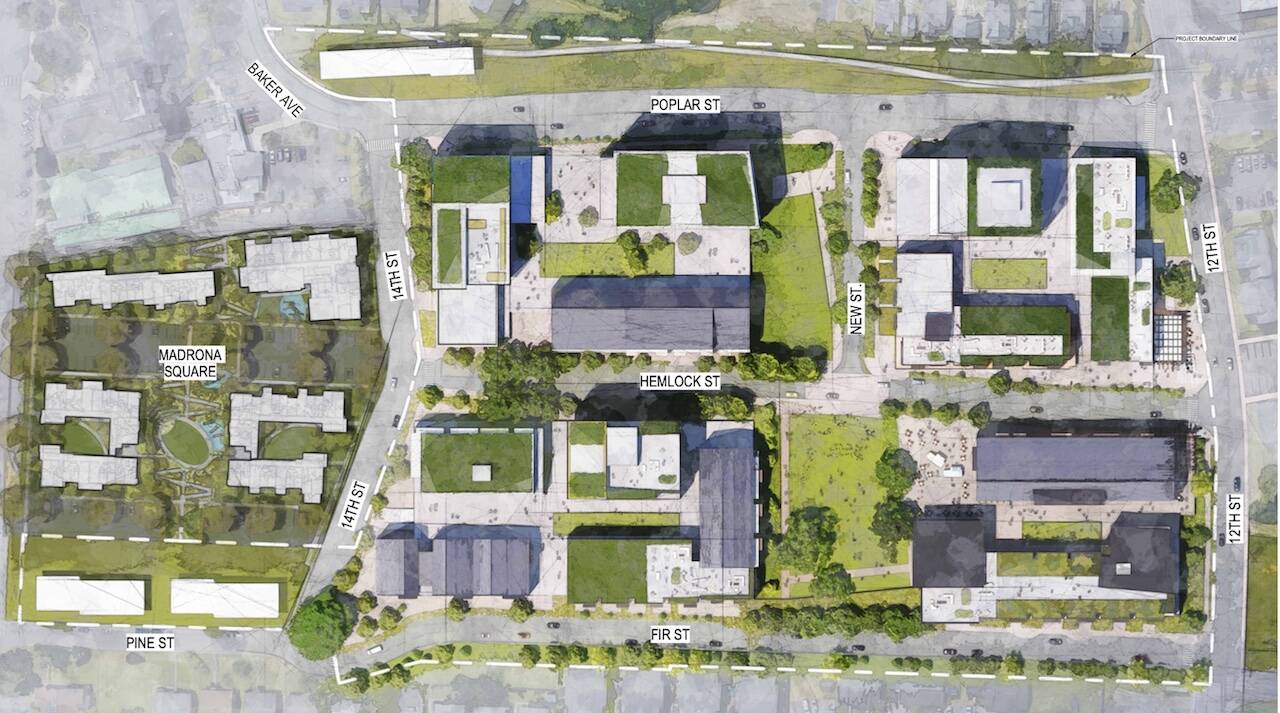Everett inches closer to Park District affordable housing plan | HeraldNet.com


Everett Housing Authority Proposes Rezone for Major Development in North Everett
The Everett Housing Authority is seeking approval from the City Council for a proposed rezone that would pave the way for a significant development in north Everett. The development, known as the Park District, aims to include a mix of restaurants, stores, offices, nonprofits, a public park, and 1,500 mixed-income homes. Some of the residential buildings could reach heights of up to 12 stories.
Background
The proposed development site is currently occupied by Baker Heights, a World War II-era public housing development. However, the housing authority shut down the development in 2019, leaving the area vacant. The new complex would replace Baker Heights and provide much-needed housing options for the community.

A three-dimensional rendering of the Park District is featured in the Everett Housing Authority’s proposed development plan. (Provided by the Everett Housing Authority)
City Council Approval Process
In March, the city’s Planning Commission recommended that the City Council approve the housing authority’s proposed changes to city code, which include reduced parking requirements and taller building allowances. Public hearings on the proposals will be held during the City Council meetings on June 26 and July 10, with a council vote following the latter meeting.
The housing authority plans to implement the development in phases over a 10-year period. The first phase, completed last year, did not require a rezone and consists of 67 units for homeless families with children enrolled in Everett Public Schools and 38 additional affordable housing units.
Community Concerns and Collaborative Efforts
Some residents in the Delta neighborhood, where the development is located, have expressed concerns about the project. The Delta Neighborhood Association has cited building height and the lack of community amenities as their main objections. However, after collaborating with the housing authority and the city, the association has seen positive changes to the plan. These changes include wetland stewardship, preservation of Wiggums Hollow Park, and pedestrian improvements.
The housing authority has committed to maintaining the park, transforming nearby wetlands into a conservation and education outdoor public amenity, and supporting retailers in the Park District. The authority is also working with the city to improve pedestrian infrastructure.
Height Maximum and Parking Requirements
The initial plan included buildings up to 15 stories high, but this was reduced to 12 stories to address concerns about building height. However, the housing authority is still requesting a height maximum of 15 stories for multifamily residential land. Developers would need council approval to construct buildings higher than 10 stories.
If approved, the plan would also reduce parking requirements on site. Currently, homes in the Park District are required to have one parking space per unit. The proposed modification would decrease this requirement to 0.7 parking spaces per bedroom, based on data from King County.
Impact on Public Services and Revenue
The influx of new residents would increase the demand for police and fire services. The environmental impact statement estimates that the city would need to add eight new positions in the police department and up to 15 firefighters to accommodate the population increase associated with the Park District. The fire department may also require a new or enlarged station.
Although housing authorities are not subject to property taxes, the housing authority has agreed to pay the city $230 per unit per year, starting 15 years after buildings are certified. This payment is estimated to bring in $345,000 annually to help mitigate the cost of increased public services. The city would also see an estimated increase in sales tax revenue and shared population-based revenue from the state as a result of the development.
Conclusion
The Park District development in north Everett, proposed by the Everett Housing Authority, aims to address the housing shortage in the area while revitalizing the vacant Baker Heights site. The project aligns with several Sustainable Development Goals (SDGs), including Goal 11: Sustainable Cities and Communities, by providing mixed-income housing, community amenities, and improved infrastructure. The City Council’s approval of the rezone and proposed changes to city code will be a significant step towards realizing these goals and creating a more sustainable and inclusive community.
For more information, contact Sophia Gates at sophia.gates@heraldnet.com or visit the original article.
Source: heraldnet.com








